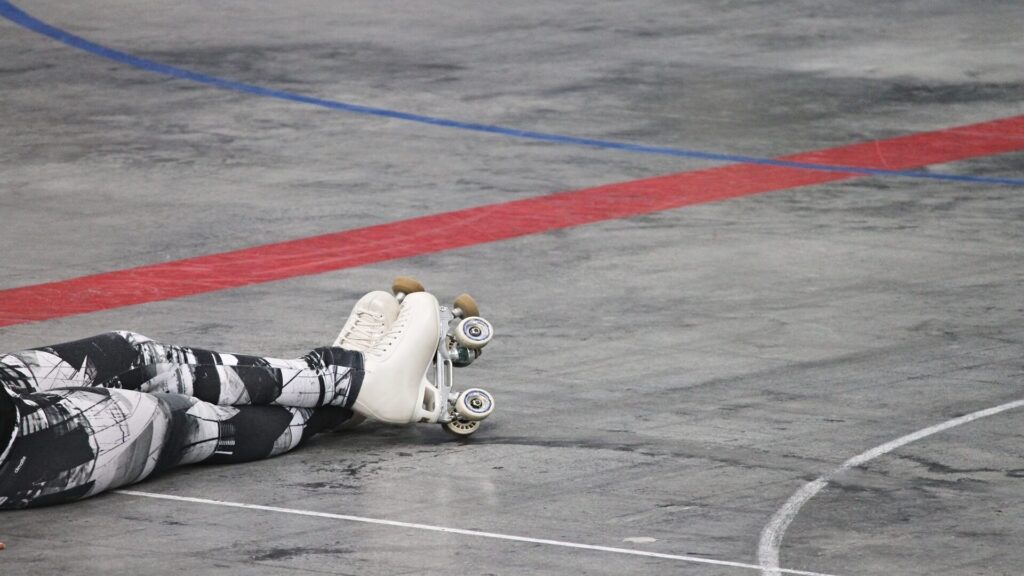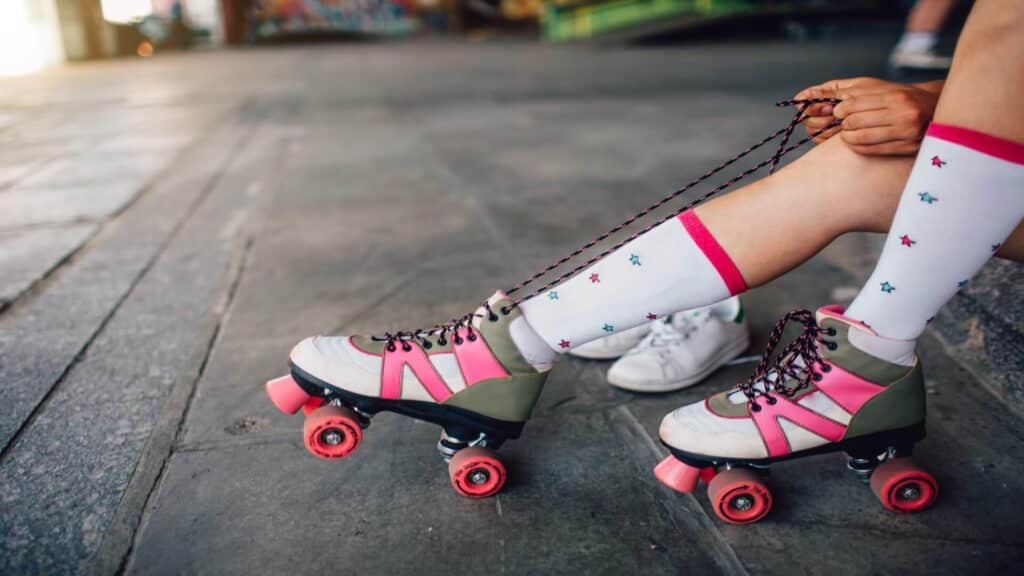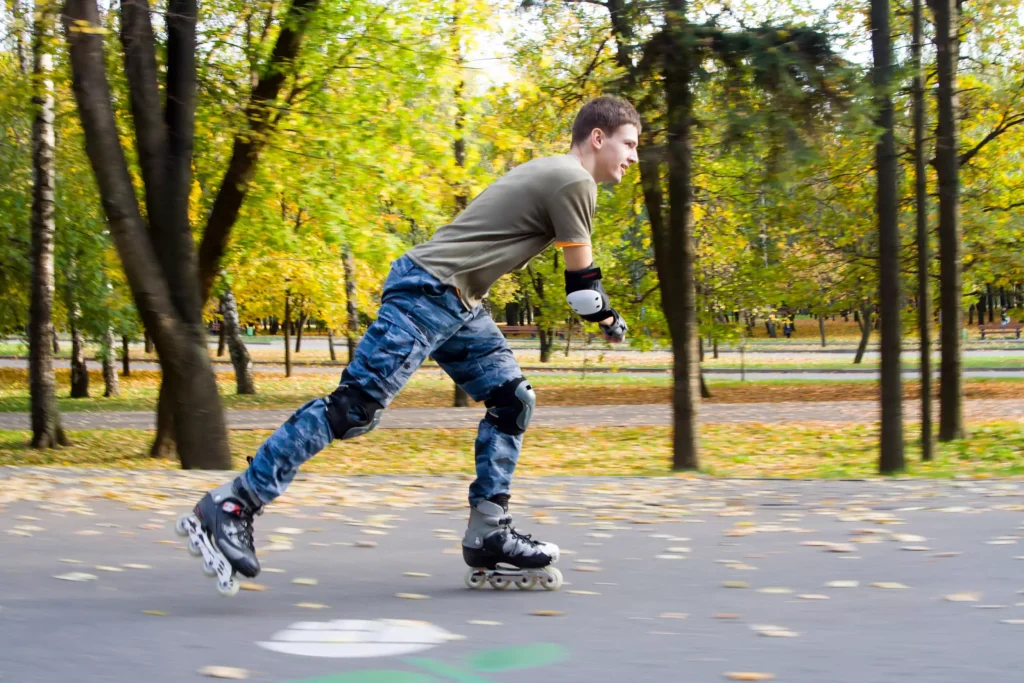Roller skating has been a popular recreational activity and sport since the late 19th century. In recent years, there has been a resurgence in its popularity, with more people taking up the hobby for fun, fitness, and socializing.
However, as with any physical activity, it’s essential to understand the potential risks involved. This article aims to discuss the dangers associated with roller skating and provide tips on how to minimize those risks while enjoying the sport. So, is roller skating dangerous? Let’s dive in.
Table of Contents
Roller Skating Injuries
Common Types of Injuries
As a roller skater, you may experience a variety of injuries. Some of the most common types of injuries include:
- Sprains and strains: Overstretching or tearing the ligaments and muscles surrounding the joints, most commonly affecting the wrists, knees, and ankles.
- Fractures: Broken bones can occur when falling or colliding with another skater or object.
- Dislocations: Joints forced out of their normal positions, typically affecting shoulders, fingers, and elbows.
- Cuts and bruises: Minor injuries resulting from falls or contact with obstacles.
If you wish to read more articles about roller skating injuries/health issues, click here.
Injury Rates in Comparison to Other Sports
While roller skating can lead to injuries, it is not inherently more dangerous than many other sports. For instance, sports such as football, soccer, and basketball also have their share of risks and injuries. However, the severity of roller skating injuries can vary, with some being minor and others requiring medical attention.
The Severity of Roller Skating Injuries
The severity of roller skating injuries largely depends on the type of injury sustained, the skater’s skill level, and the circumstances surrounding the accident. While minor injuries like cuts and bruises may heal quickly, more severe injuries like fractures and dislocations can require medical treatment and lead to long-term complications.
Factors Contributing to Roller Skating Dangers
Inexperience
One of the significant factors contributing to roller skating dangers is inexperience. Beginner skaters are more likely to make mistakes or have accidents as they learn the sport. Proper training and practice are essential in developing the skills needed to skate safely and minimize the risk of injury.
Lack of Safety Equipment
Another factor that contributes to roller skating’s dangerous reputation is the lack of safety equipment. Wearing helmets, wrist guards, knee pads, and elbow pads can significantly reduce the risk of injuries. However, some skaters choose not to use this protective gear, increasing their chances of sustaining injuries in the event of a fall or accident.
Skating in Unsafe Environments
Skating in poorly maintained or unsafe environments can also contribute to the dangers of roller skating. Uneven surfaces, debris, or obstacles can lead to accidents and injuries. Skating in public areas not designated for roller skating may also increase the risk of colliding with pedestrians, cyclists, or vehicles.
High-Speed Roller Sports
Lastly, participating in high-speed roller sports, such as roller derby or aggressive inline skating, increases the risk of accidents and injuries. These activities require a higher skill level and often involve contact with other skaters, leading to more potential hazards.
Measures to Reduce Risks
Proper Training and Education
Investing in proper training and education is one of the best ways to minimize roller skating risks. Taking roller skating lessons or classes can help beginners learn the fundamentals of the sport and develop their skills more safely. Experienced skaters can also provide valuable guidance and support.
Use of Safety Equipment
Using safety equipment is crucial to reduce the risk of roller skating injuries. Investing in quality gear and using it correctly can significantly prevent accidents or minimize their impact. Regularly checking and maintaining your equipment can also ensure that it remains in good working condition.
Skating in Designated Areas
To minimize the dangers associated with roller skating, it is essential to skate in designated areas. Indoor and outdoor roller rinks provide a controlled environment with smooth surfaces and proper safety measures in place.
Skate parks are another option, as they are designed specifically for roller sports and usually feature ramps, rails, and other obstacles for more advanced skaters.
Following Safety Guidelines and Rules
Adhering to safety guidelines and rules while roller skating can help prevent accidents and injuries. Skating at appropriate speeds, being aware of your surroundings, and observing proper etiquette when sharing the space with other skaters can significantly reduce risks.
Additionally, knowing your skill level and not attempting advanced maneuvers or tricks without adequate practice can help you stay safe on your skates.

Conclusion
Is roller skating dangerous? Like any physical activity, it does come with certain risks. However, with the proper training, use of safety equipment, and adherence to safety guidelines, roller skating can be a fun and healthy activity for people of all ages.
By being aware of the potential dangers and taking measures to minimize risks, you can enjoy roller skating as a safe and enjoyable pastime.
FAQs
Question: What are the most common injuries sustained while roller skating?
Answer: Some of the most common roller skating injuries include sprains, strains, fractures, dislocations, cuts, and bruises.
Question: How does roller skating compare to other sports in terms of injury rates?
Answer: While roller skating can lead to injuries, it is not inherently more dangerous than many other sports, such as football, soccer, or basketball. The severity of roller skating injuries can vary, with some being minor and others requiring medical attention.
Question: What factors contribute to roller skating dangers?
Answer: Inexperience, lack of safety equipment, skating in unsafe environments, and participating in high-speed roller sports are some factors that can increase the risk of injuries while roller skating.
Question: How can I minimize the risks associated with roller skating?
Answer: To reduce roller skating risks, invest in proper training and education, use appropriate safety equipment, skate in designated areas, and follow safety guidelines and rules.
Question: Is it essential to use safety equipment while roller skating?
Answer: Yes, using safety equipment such as helmets, wrist guards, knee pads, and elbow pads can significantly reduce the risk of injuries while roller skating.
Question: What are some safety guidelines I should follow while roller skating?
Answer: Some safety guidelines to follow include skating at appropriate speeds, being aware of your surroundings, observing proper etiquette when sharing space with other skaters, and not attempting advanced maneuvers or tricks without adequate practice.
Question: Are certain roller sports more dangerous than recreational roller skating?
Answer: High-speed roller sports like roller derby or aggressive inline skating can be more dangerous due to the increased risk of accidents and injuries. These activities require a higher skill level and often involve contact with other skaters, leading to more potential hazards.









